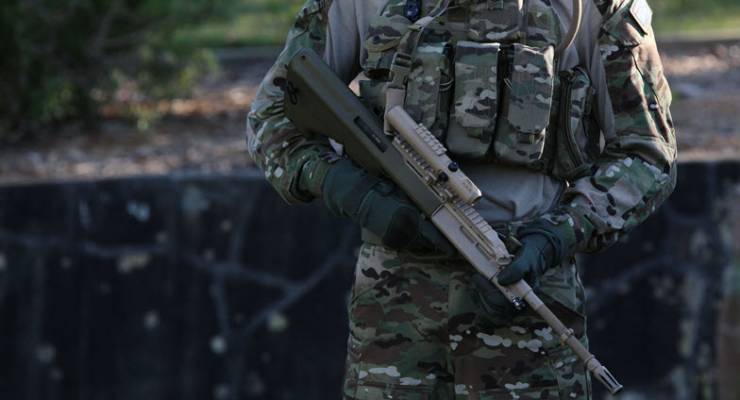
The Defence Department has bluntly opposed growing calls to strip or otherwise reduce the unilateral power of the prime minister to send the country to war or enter armed conflict without parliamentary approval or oversight.
The views of the department, justified by reference to what it called a “risk [of] significant adverse consequences” to national security, were relayed via a submission to the parliamentary inquiry examining reform of war powers.
In short, the department said any move to subject the decision to go to war to parliamentary approval or veto could jeopardise security intelligence and risk the strategic position of the country.
But Australians for War Powers Reform president Alison Broinowski said the department’s concerns, which echo that of Defence Minister Richard Marles, were overstated and misguided, and ran contrary to the approach of comparable democracies around the world.
“Every democracy, including Australia, must confront the question of how to decide to go to war and many do it in a much more democratic fashion than Australia,” she said, citing the recent evolution of convention in the United Kingdom and Canada.
“You have to wonder at the department’s opposition to democratic oversight,” the former high-profile diplomat added. “Giving our elected representatives a vote on something as fundamentally significant as war is these days far from radical or controversial.”
It’s a position supported by eminent legal experts, civil liberties organisations and distinguished veterans, including former defence force chief Chris Barrie, former army chief Peter Leahy and retired Major Cameron Leckie.
“Obviously, the Defence Department does not want to fetter its hands, but times have really changed,” said international law expert Ben Saul, who characterised the department’s submissions as an anachronistic “hangover of an era” in which power to declare war was purely a prerogative of the sovereign.
“Since 1945, the power to declare war has not been a pure discretion of the executive; we’re a party to the United Nations Charter, which bans war subject to international law exceptions, and that brings with it public expectations that Australia will act consistently with the international regime.
“International law and an international rules-based order are bedrock Australian values — our government should be expected to [legally] justify its decision to go to war openly and publicly before Parliament.”
Constitutional law expert George Williams broadly agreed with Saul’s views, saying the backdrop of international law inevitably raised issues that could not have been foreseen when the constitution was drafted.
“We’re talking about a power that made sense in the 1890s in a different world in which there was no United Nations, no [legal] issues around wars of aggression or war crimes, no human rights,” he said. “The world has changed; the problem is, we haven’t.”
War powers reform has been afoot in the UK and Canada since the illegal invasion of Iraq nearly 20 years ago, which Williams said had sheeted home the dangers and inappropriateness of having such powers reposed, by convention, in the prime minister or cabinet alone.
“We’re not at the front end of this debate,” he said. “So the readiness of the Defence Department and minister to close down the debate here really does surprise me.
“The UK’s experience is proof that any national security issues can be navigated in the design process.”
To this end, advocates of reform – including Saul and Williams – say any changes to the war powers would inevitably allow for extreme circumstances, such as invasion, in which prospective parliamentary debate on or authorisation of military force wasn’t feasible.
But in Saul’s view, there would be few situations in which any such exception could reasonably be enlivened.
“If you think about deployments like East Timor, Iraq or Afghanistan, none of those were so urgent that there wouldn’t have been time to call even an emergency session of Parliament to debate the issue,” he said.
“As the Iraq war shows, it is perfectly possible to disclose legal advice without prejudice to the government’s position, and in fact we’re already required to report to the UN Security Council if we use force, so it’s not a big ask to put that legal position on the record and allow Parliament to debate it.
“It can only improve the quality of decision-making in the end.”
Williams, too, was of the view parliamentary oversight over possible conflict would ultimately sharpen the accountability of government and lend public legitimacy to any decision arrived at.
“When a country goes to war, it’s really important the community understands and accepts the decision,” he said. “And that is more likely to happen if the decision involves the people’s representatives and is not made in secret.”
Of the 111 submissions received by the inquiry, only three entirely opposed subjecting the power to enter armed conflict to parliamentary oversight or control.
Should the decision to go to war rest only with the prime minister and his or her cabinet? Let us know by writing to letters@crikey.com.au. Please include your full name to be considered for publication. We reserve the right to edit for length and clarity.








One of the great speeches ever given in our Parliament was by Simon Crean opposing Howard’s commitment to Iraq
At any rate this debate is a waste of time and effort as Washington will decide when Australia goes to War and where Australia goes to War
Bearing in mind the announcement of increased US military presence in the NT (thereby making us a target), I suspect Australia will go to war in Australia.
The inevitable question arises. What are they hiding? What is so harmful of knowing why hundreds of thousands of young Australians are to be put to death and for what reason?
Have a look at the ‘Pentagon Papers’ when hundreds of thousands died as a result of the US Administration not wanting to lose face both (domestically and internationally) by withdrawing from Vietnam if you what ‘they are hiding’
THose papers also show that the US did not ask us to go to Vietnam. The request from South Vietnam I believe originated in our embassy in Saigon.
1995, from the opening of Cabinet papers covered by the “Thirty Year Rule” we know tha Ming the Mendacious, was definitely “economical” with the truth.
At the time Menzies had stated that the commitment of troops to the Viet Nam Farrago in 1962 was made on the basis of a request from President Diem. Much of what Menzies said was in fact lies. Diem had not asked Australia for help and had in fact tried to dissuade Australia from becoming involved.
This was because Diem was having enough trouble dealing with the US and did not want yet another interloper in Viet Nam. It had, in fact, taken a request created by the Diem government, at Menzies’ strong insistence, to the Australian government to ensure the commitment to the so called Republic of South Vietnam.
please don’t legitimise Le Duan’s socialist dictatorship by calling it “so-called RVN”
And the legitimacy of SVN from Diệm onwards?
Tyranny?
Form of government in which the ruler is absolute dictator, not restricted by a constitution or laws or opposition etc
That referendum instigated by Ngô Đình Diệm and run by by his brother Ngô Đình Nhu, wherein Diệm claimed he had achieved 98.2% of the vote.
Misery?
A state of ill-being due to affliction or misfortune.
Most people in Vietnam were Buddhist. The French had passed laws to discourage Buddhism. After the French left, Catholics managed to hold onto power. Diệm a devout Catholic mostly appointed people to positions of authority who were Catholic.
This angered Buddhists, especially when Diệm’s government refused to repeal anti-Buddhist laws. In May 1963, Buddhists assembled in Hue to celebrate Buddha’s birthday. Police dispersed them by opening fire, killing women and children. Later housands of Buddhist monks were arrested with many disappearing, never to be seen again.
Turpitude?
Acts done contrary to justice, honesty, modesty or good morals.
Apart from the above ?
Refusal to hold elections in 1956 under the Geneva Agreements, 1954.
Most egregious?
In 1958 the revival by Ngô Đình Nhu. Diệm’s brother, of opium trafficking.
This in order to fund the repression of growing armed insurgency and political dissidence.
The opium as well as gold shipments were flown from Laos to Saigon SVNAF transports commanded by Nguyễn Cao Kỳ, later Premier and Vice President of SVN
And it is to become much worse following Diệm’s and Nhu’s 1963 assassination.
Apart from the drug trade, which also included heroin, and the gold smuggling there was the “ghost soldier” racket.
Large numbers of ghost soldiers who had had been killed or deserted on their roles kept on as still enrolled. As ARVN units were allocated a set amount of rice for each soldier monthly, this allowed the officers to sell the excess rice for their own profit.
ARVN officers also stole the pay allocated to these non-existent soldiers.
That corruption was sufficiently widespread that it led to a significant over-estimation of the size of the army.
There are good reasons not to let defence decide to go to war. The biggie is that defence people, like the police, prison guards, security officers, spies etc tend to be a bit right wing. This comes with a bundle of questionable traits incuding racism, mysogeny, trans and homophobia, white spremacy, a tendency to think in terms of good and bad, punishment of others, an easy relationship with the use of force and a whole lot more. People like this might be more or less ok to prosecute a war but not suitable to have the decisionmaker power over it.
Plus next thing you know they will decide a democratically government is in their way. We have seen this before. Best not go there.
If memory serves a number of senior military officers were rumoured as having thoughts about the removal of the Whitlam government
The sabre-wielding Captain DeGroot was so frustrated with Premier Jack Lang he was moved to mount a steed and take direct action. These days he would be rewarded with a spot on Sky After Dark. His ideological spawn still walk amongst us, though most would have trouble mounting a horse.
No trouble mounting a sheep.
Most have trouble mounting a sensible argument
With the benefit of hindsight, we now know that those senior military officers having those thoughts were in all likelihood American. Any discussion of the Pine Gap facility causes their fundamental orifice to tighten, to this day.
The NCOs made it clear to the brass that the ‘men’ would not have a bar of it.
The same class, Sgt-Majors esp, sorted out the shiny pants brigade a few years later in the UK during their Labour interregnum – Chris Mullins’ A Very British Coup was the factional version.
Can’t wait for the follow-up to A Very British Coup ie. A Very Australian Coup. “The Dismissal” just doesn’t get there, for some reason or other.
Considering that all the conflicts Australia has been involved in since WW2 have been more about ideology than a direct threat to Australia we sure as hell should take the decision out of the Prime Ministers hands. Our involvement in the disastrous wars in Vietnam and Iraq are evidence of that.